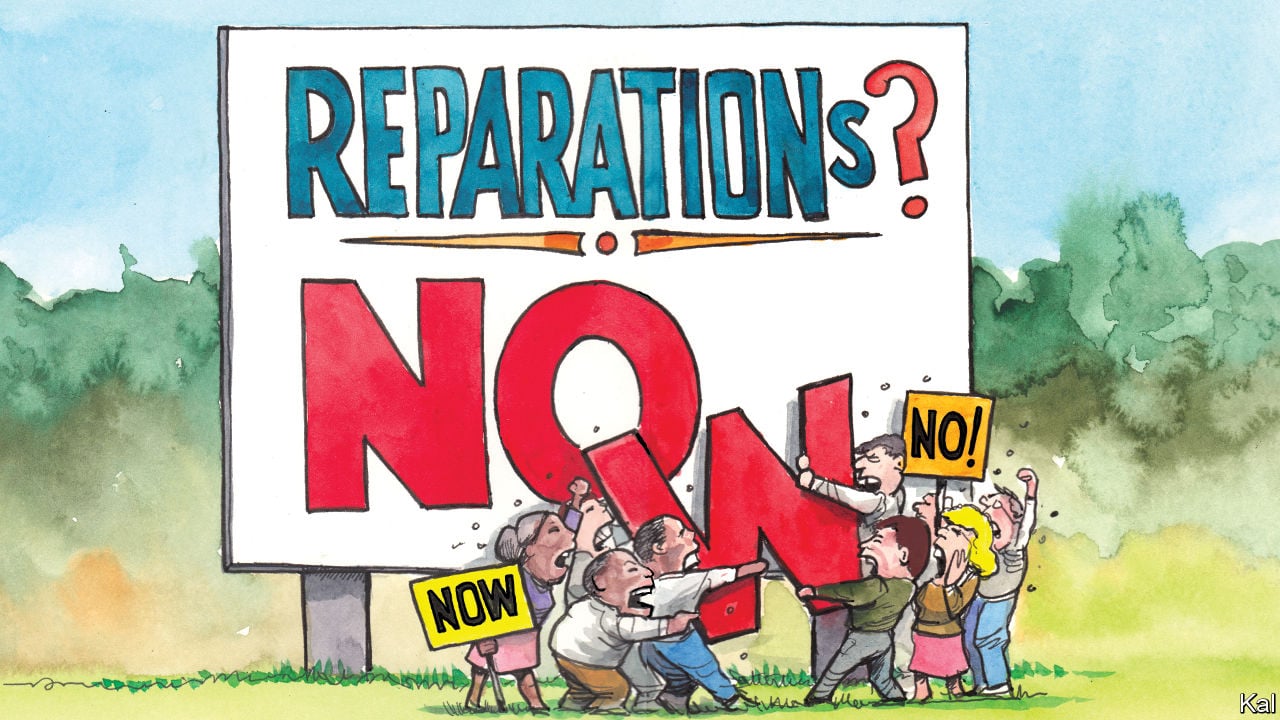Guest essay: Applying legal test, reparations might be zero
By Prof. John Banzhaf
WASHINGTON, D.C. -- Several members of Congress have introduced a "Reparations NOW" resolution calling for $14 trillion in reparations for Black Americans, claiming that "The United States has a moral and legal obligation to provide reparations for the enslavement of Africans and its lasting harm on the lives of millions of Black people.”

Illustration courtesy of The Economist
But this $14 trillion sum is more than twice the total amount the U.S. spent in FY 2022 ($6.27 trillion), and paying (or promising to pay) anything like it would increase the country's current debt by almost 50% (now almost $32 trillion, or about $250,000 per taxpayer).
Similarly, economists have estimated that the cost of the reparations plan for the State of California -- which never even had slaves -- could cost more than $800 billion, which dwarfs that state's annual budget of roughly $300 billion. And more than three-fourths of Black Americans think Americans should pay them reparations.
While making demands which to many seem outrageously high may make little sense, it is actually a common negotiation tactic.
Attorneys seeking to pressure the other side to pay are often counseled to make the first opening demand/offer as high as possible, or at least as high as one can even arguably justify it with some form of analysis, even a highly questionable one.
This initial outrageously high demand tends to accomplish at least two purposes for those seeking a big payoff.
First, it makes any subsequent (and usually closer to what is actually expected) offer seem very reasonable by comparison.
Second, responding to an outrageously high demand may lead the parties to focus more on the amount of any possible agreement, rather than on the more fundamental issue of whether there is a legal or other basis for the demand.
Here, while supporters of the reparations probably understand that governments are very unlikely to voluntarily agree to bankrupt themselves -- and to impose intolerable burdens on taxpayers -- to pay reparations, they probably hope that these impossibly high numbers will make subsequent demands seem more reasonable by comparison, and divert attention from whether there is or is not a valid claim, and how its value should be calculated.
Seeking reparations for the burdens of slavery, especially in states such as California which never had slavery or even cooperated in returning runaway slaves, may not seem logical, since no one who suffered the intolerable burdens of slavery -- or even their immediate descendants and heirs who might be named in any will -- is alive today.
In most legal proceedings, the proper and generally-accepted method for juries to determine values to be paid to third parties is to seek to estimate how much worse off the actual living plaintiffs are as a result of the event which is the basis of the claim.
For example, if a breadwinner is killed as the result of an automobile accident or dangerous drug, the amount to which the family is entitled is the amount the breadwinner would have been able to contribute to them over what would have been his or her estimated lifetime.
So, some might argue, the best way to determine an amount of any reparations, assuming that some reparations should be made at all, might be to ask how much worse off are the remote present-day descendants of Black persons who were taken from their homes in Africa as a result of their unlawful enslavement and transportation to slave owners in the U.S.
One way to do that might be to compare the income and living standards of the current residents of the countries from which slaves were taken with those of their descendants now living in the U.S.
Unfortunately, such a comparison would probably show that -- notwithstanding the unspeakable cruelty of slavery and the enormous amount of uncompensated labor their ancestors were forced to perform for which the now-long-deceased slaves themselves can never be compensated -- the average African American now residing in the U.S. as a result of their ancestors having been transported here against their will is better off financially than the descendants of those who were not unlawfully taken; as clearly evidenced by the average income of those now living in those countries.
For example, as a very rough original calculation and comparison, it appears that the average monthly salary in Africa is approximately $769 USD, as per the exchange rates in April 2023. By way of comparison, "the median household income for Black U.S. households in 2021 is $46,400,” according to Pew Research.
So, it appears that Blacks in the U.S. who are descendants of slaves are much better off financially, on the average, than descendants of those who were not taken away as slaves and remained in the country of their birth.
While it might be possible to do a more complete and individualized analysis by comparing the income of African Americans now living in the U.S. with the income of Africans still living in the regions from which many slaves were taken -- primarily Senegambia and West-Central Africa -- looking at the income of people now living there does not help, since income in those countries is likewise much lower than that of Black descendants of those who came to the U.S. as slaves.
Those who support reparations sometimes also argue that there should be compensation for the post-slavery harm caused by laws -- including but not limited to the Jim Crow laws in the South -- which discriminated against and thereby harmed Black Americans.
But, as a general rule, descendants of persons who were discriminated against and harmed by statutes which were properly enacted and therefore valid at the time -- including those laws which are now illegal and/or widely condemned -- are not entitled to compensation for financial harm caused by such laws if the statutes were legal at the time.
For example, while laws in many states not only discriminated against homosexuals but actually also made some of their sexual practices a felony which sent many to prison, descendants of such persons are not entitled to any legal compensation for that then-legal discrimination.
A similar result would apply to descendants of persons who suffered harm because of statutes in the past which discriminated on the basis of race, national origin, religion, sex, etc. which were lawful at the time, but which would not be tolerated today.
Although the terrible treatment and harms suffered by slaves is far worse and much more serious than most of those suffered by other discriminatory statutes which were legal at the time, it can be argued that the same legal principle of not compensating remote descendants for those harms should likewise apply.
In summary, the extraordinarily high demands now being made by those who argue for reparations are not illogical, especially when considered as a negotiating tactic, but the underlying questions of whether reparations should be paid at all, and if so in what amounts and to whom, are complex questions as to which there are many arguments.
-----
John Banzhaf is professor of Public Interest Law at George Washington University Law School, Washington, D.C.



